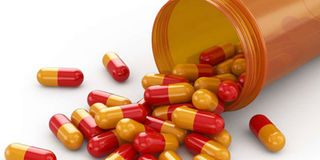Ministry of Health all set to regulate drug prices

The Ministry of Health plans to draft a policy that will regulate the price of essential medicines. FILE PHOTO | NATION MEDIA GROUP
What you need to know:
- If the schedule is implemented, the cost of drugs and treatment would be the same across Kenya.
- Health Cabinet Secretary Sicily Kariuki said that pharmaceutical firms would not be allowed to go against the price ceiling.
- According to the EACC findings, Kenyans are paying as much as 5,000 per cent more for medicines and treatment in public hospitals.
- An operation on the bladder, for example, can cost Sh7,500 for cash-paying patients, but the price shoots to Sh90,000 for those using NHIF and other cards.
The Ministry of Health plans to draft a policy that will regulate the price of essential medicines.
If the schedule is implemented, the cost of drugs and treatment would be the same across Kenya.
Health Cabinet Secretary Sicily Kariuki on Monday said county governments would have to adhere to the prices set for drugs and non-pharmaceutical products.
“The county governments we have talked to are happy with the idea,” the minister said.
She added that pharmaceutical firms would not be allowed to go against the price ceiling.
HUGE VARIATION
Ms Kariuki made reference to the recent Ethics and Anti-corruption Commission report, which showed a huge variation in what counties charge for the same drugs and treatment.
She said devolved governments would have to set up a committee on pricing of the services and medicine “for the benefit of Kenyans”.
“The EACC report, exposed systemic weaknesses in the procurement and dispensing stages of pharmaceutical and non-pharmaceutical supplies in the public sector," she said.
"This denies many Kenyans access to quality, affordable medical products and services.”
The CS, who was speaking at Swiss Lenana Mount Hotel during the launch of the rapid result initiative on post-marketing surveillance of medicines, said the 100-day exercise would help address some of the problems mentioned in the report.
DISTRIBUTION COSTS
According to the EACC findings, Kenyans are paying as much as 5,000 per cent more for medicines and treatment in public hospitals.
An operation on the bladder, for example, can cost Sh7,500 for cash-paying patients, but the price shoots to Sh90,000 for those using National Hospital Insurance Fund and other cards.
The report said counties which buy drugs from Kenya Medical Supplies Agency at a subsidised fee increase prices by astronomical margins.
When Kemsa delivers the drugs, the devolved governments are allowed to increase prices by no more than 20 per cent, to cover distribution costs.
That, however, has not been the case.
QUALITY DRUGS
For instance, H. pylori bacterial infection dose consisting of 14 tablets of 500mg clarithromycin, 1mg amoxicillin and 30mg lansoprazole, is sold at Kemsa for Sh840, while it goes for Sh1,300 at Coast General Hospital. At Nakuru Level Five Hospital, it is sold for Sh2,400.
Ms Kariuki said the ministry would also visit public and private hospitals countrywide to assess the quality of drugs.





